
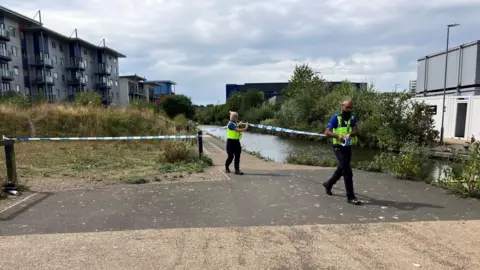 BBC
BBC
A “chemical incident” resulted in a toxic spillage affecting a 12-mile stretch of canals in the West Midlands, the firm involved said.
Anochrome Ltd, which deals in surface coatings and sealing, said the incident “regrettably” released chemicals into the Walsall waterway in the early hours of Monday.
Marc Lidderth, the Environment Agency’s (EA) West Midlands area director, said the release of sodium cyanide into the water was “unacceptable” and strong action would be taken if there was any wrongdoing.
People have been urged not to go near a long section of the canal network from the middle of the borough to Birmingham and connected waterways in Wednesbury, Tipton and West Bromwich.

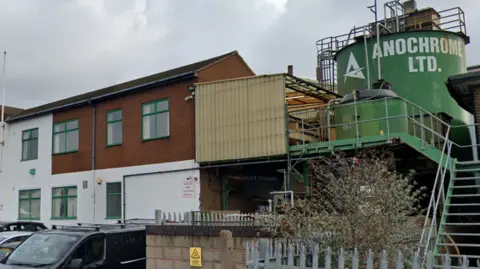 Google
Google
Sodium cyanide, which can cause seizures, vomiting and loss of consciousness, was confirmed as the chemical spilled into the waterway in Walsall.
Anochrome said it had immediately notified the EA and Severn Trent Water following the incident.
“Our senior management team has been – and remain – on-site working collaboratively with all relevant authorities and agencies to minimise and contain the spill,” it said.
The company added it had made all facilities available to the authorities and agencies, including inhouse laboratory testing facilities.
“The safety of our community and the environment is our top priority. We are focused on limiting the impact of this incident and will provide further updates as they become available,” it added.
Speaking to BBC Midlands Today, the EA’s Mr Lidderth said Anochrome Ltd, which describes itself as an “environmentally aware organisation” on its website, was regulated by the EA.
He said sodium hydroxide and “possibly zinc” were also thought to have entered the canal.
“It is unacceptable that this has entered the watercourse and we’re doing investigations into what has actually caused that and why it has escaped from their site into the canal system,” he added.
Walsall Council earlier confirmed the source of the spillage had been identified and stopped.
Wildlife experts said the spillage’s impact would be devastating while a couple on a narrowboat said they had been trapped on the canal since Monday as they had not been able to pass through locks due to the water testing.
“We’re testing all points of that affected area currently and we’ll be reviewing those results as they come through,” Walsall Council’s interim director of public health, Nadia Inglis, said.
“We’ll be removing those restrictions and hopefully reducing the size of that potentially affected area where we are confident there isn’t a risk to health.”
The exclusion zone markers run from the Walsall lock flight to lock flights at Rushall/Ryders Green in the borough and Perry Barr in Birmingham.

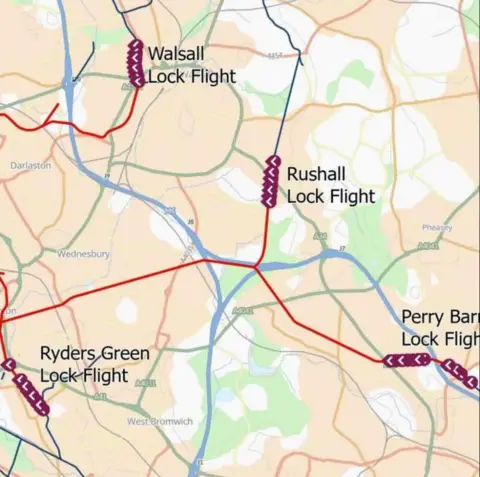 Walsall Council
Walsall Council
Sodium cyanide dissolves in water and can have serious adverse health effects if people or pets come into direct contact with it, the council advised.
Anyone exposed to the water who felt unwell should seek medical advice through the NHS 111 service or phone 999 in an emergency, a spokesperson for the authority added.
People living on boats on the canal in the affected area were being made aware of the spill, the Canal and River Trust said.
Dr Inglis added: “Our primary aim has been to keep the public safe and to protect their health and wellbeing.
“Given the nature of the substance, we’re taking a cautious approach to protecting our public until we know it’s safe to open those canal towpaths again.”

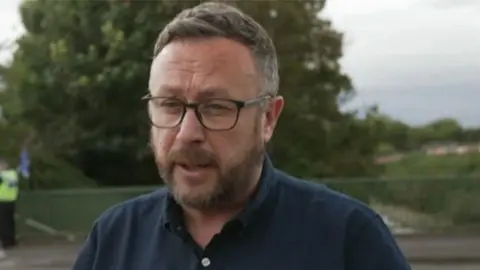
What is sodium cyanide?
- The chemical sodium cyanide is a white crystal-like solid with a faint almond odour
- It is used in industry for metal cleaning, plating and extraction
- When cyanide salts are swallowed they release cyanide in the body – they can also be absorbed through the skin
- Expose can cause symptoms including headaches, nausea, dizziness, loss of consciousness, seizures and vomiting
- It can be rapidly fatal if inhaled or ingested as it interferes with the body’s ability to use oxygen
(Source: UK Health Security Agency)
Dr Delia Garratt, chief executive of Birmingham and Black Country Wildlife Trust said the spillage would have a devastating impact on wildlife.
She added she hoped those responsible would face the full force of the law.
“Environmental watchdogs must be empowered and sufficiently resourced to ensure they can monitor and inspect polluters, and enforce penalties upon those who break the law,” she said.


Boater Daisy Hampshire, 55, who spends her summers on the canals, said she was angry and sad.
“It’s part of our heritage. It’s been here 200 years and it’s still here after 200 years,” she said.
“As long as someone’s held accountable – floaters as a community are amazing, we will club together and we will start again.”
She was in the area for the Brownhills Canal Festival this weekend, not currently affected by the spillage.
However, the Narrow Boat Trust, which was due to have two historic boats at the festival, has decided not to attend, citing the difficulty of getting there and back in time due to the canal exclusion zone.

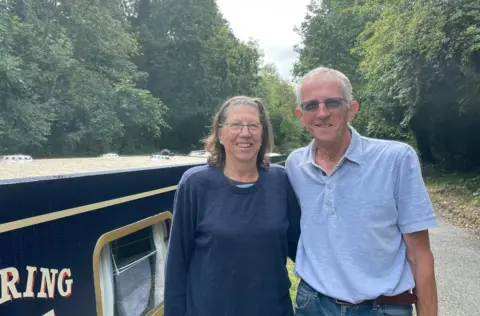 Sophie Robinson/PA Wire
Sophie Robinson/PA Wire
Bruce and Lauris Crook, 72 and 70, originally from New Zealand, have been unable to pass through the locks on the canal in Rushall, Walsall, since Monday.
“We registered with the Canal and River Trust as an interested party and they’ll let us know when they’re happy that the boats start moving again,” Mr Crook said.








